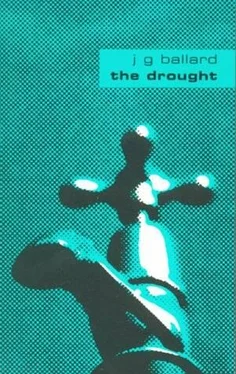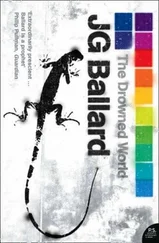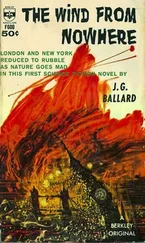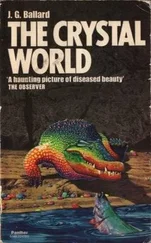"What? I don't believe it!" Judith brushed her hair down across her temple. "He's always been a lone wolf. Did he tell you himself?"
"Not exactly, but-"
"Then you're imagining it." She divided the fish into two equal portions, steering the knife precisely down the midline with the casual skill of a surgeon. "Jonathan Grady is his own master. He couldn't accept that crazy old clergyman and his mad daughters."
Ransom chewed the flavorless steaks of white meat. "He was talking about it while we waited for the tide. It was obvious what was on his mind-he's sensible enough to know we can't last out on our own much longer."
"That's nonsense. We've managed so far."
"But, Judith… we live like animals. The salt is shifting now, every day it carries the sea a few yards further out."
"Then we'll move along the coast. If we want to we can go a hundred miles."
"Not now. There are too many blood feuds. It's an endless string of little communities, trapping their own small pieces of the sea and frightened of everyone else." He picked at the shreds of meat around the fish's skull. "I have a feeling Grady was warning me."
"What do you mean?"
"If he joins the settlement he'll be one of Jordan 's team. He'll lead them straight here. In an obscure way, I think he was telling me he'd enjoy getting his revenge."
"For his father? But that was so far in the past. It was one of those terrible accidents that happen."
"It wasn't really. In fact, the more I think about it the more I'm convinced it was simply a kind of coldblooded experiment, to see how detached from everyone else I was." He shrugged. "If we're going to join the settlement it would be best to get in before Grady does."
Judith slowly shook her head. "Charles, if you go there it will be the end of you. You know that."
An hour later, when she was asleep, Ransom left the cabin and went out into the cold morning light. The sun was overhead, but the dunes remained gray and lifeless, the shallow pools like clouded mirrors. Along the shore the rusting columns of the half-submerged stills rose into the air, their shafts casting striped shadows on the brilliant white slopes of the salt tips. The hills beyond were bright with desert colors, but as usual Ransom turned his eyes from them.
He waited for five minutes to make sure that Judith remained asleep, then picked up his paddle and began to scoop the water from the tank beside the ship. Swept out by the broad blade, the water formed a pool some twenty feet wide, slightly larger than the one he had brought home that morning.
Propelling the pool in front of him, Ransom set off across the dunes, taking advantage of the slight slope that shelved eastwards from the beach. As he moved along he kept a careful watch on the shore. No one would attempt to rob him of so small a pool of water, but his departure might tempt some roving beachcomber to break into the shack. Here and there a set of footprints led up across the firmer salt, but otherwise the surface of the dunes was unmarked. A mile away, toward the sea, a flock of gulls sat on the wet saltflats, but except for the pool of water scurrying along at Ransom's feet, nothing moved across the sky or land.
Chapter 9 – The Stranded Neptune
Like a huge broken-backed lizard, a derelict conveyer crossed the dunes, winding off toward the hidden sea. Ransom changed course as he approached it, and set off over the open table of shallow salt-basins that extended eastwards along the coast. He moved in and out of the swells, following the long gradients that carried the pool under its own momentum. His erratic course also concealed his original point of departure. Half a mile ahead, when he passed below a second conveyer, a stout bearded man watched him from one of the gantries, honing a whalebone spear. Ransom ignored him and continued on his way.
Below him a semicircle of derelict freighters rose from the saltflats. Around them, like the hovels erected against the protective walls of a medieval fortress, was a clutter of small shacks and out-buildings. Some, like Ransom's, were built from the bodies of old cars salvaged from the beach, but others were substantial wood and metal huts, equipped with doors and glass windows, joined together by companionways of galvanized iron. Gray smoke lifted from the chimneys, conveying an impression of quiet warmth and industry. A battery of ten large stills on the fore-shore discharged its steam toward the distant hills.
A wire drift fence enclosed the settlement. As Ransom approached the western gate, he could see the open surfaces of the huge water reservoirs and breeding tanks. Each was some two hundred feet long, buttressed by embankments of sand and shingle. A team of men, heads down in the cold sunlight, were working silently in one of the tanks, watched from the bank by an overseer holding a stave. Although three hundred people lived together in the settlement, no one moved around the central compound. As Ransom knew from his previous visits, its only activity was work.
Ransom steered his pool over to the gateway, where a few huts gathered around the watchtower. Two women sat in a doorway, rocking an anemic child. At various points along the perimeter of the settlement a few subcommunities had detached themselves from the main compound, either because they were the original occupants of the site or were too lazy or unreliable to fit into the puritan communal life. However, all of them possessed some special skill with which they paid for their places.
Bullen, the gatekeeper, who peered at Ransom from his sentrybox below the watchtower, carved the paddles used by the sea-trappers. In long racks by the huts the narrow blades, wired together from pieces of whalebone, dried in the sunlight. In return, Bullen had been granted proprietary rights to the gateway. A tall, hunchbacked man with a sallow bearded face, he watched Ransom suspiciously, then walked slowly across the waterlogged hollows below the tower.
"Back again?" he said. Despite the infrequency of his visits, Ransom seemed to worry him in some obscure way, part of the general withdrawal of the settlement from the world outside. He pointed down at Ransom's pool with a paddle. "What have you got there?"
"I want to see Captain Hendry," Ransom said.
Grudgingly, Bullen released the gate. As Ransom steered the pool forwards, Bullen held it back with his paddle. Taking the hint, Ransom swept several bladefuls of the water into the basin by the tower. Usually Bullen would have expected a pair of small herring at the least, but from his brief glance at Ransom's appearance he seemed to accept that these few gallons of water were the limit of his wealth.
As the gate closed behind him, Ransom set off toward the compound. The largest of the freighters, its bows buried under the salt, formed the central tower of the settlement. Part of the starboard side, facing the shore, had been dismantled and a series of two- and three-story cabins had been built onto the decks. The stern castle of the ship, jutting high into the air, was topped by a large whalebone cross, and was the settlement's chapel. The portholes and windows had been replaced by primitive stained-glass images of biblical scenes, in which Christ and his disciples were surrounded by leaping fish and sea horses.
The settlement's preoccupation with the sea and its creatures could be seen at a glance. Outside every hut, dozens of small fish dried on trestle tables or hung from the eaves. Larger fish, groupers and sharks that had strayed into the shallow water, were suspended from the rails of the ships, while an immense swordfish, the proudest catch of the settlement and the Reverend Johnstone's choice of a militant symbol to signify its pride, was tied to the whalebone mast and hung below the cross, its huge blade pointed heavenwards.
Читать дальше
Конец ознакомительного отрывка
Купить книгу








